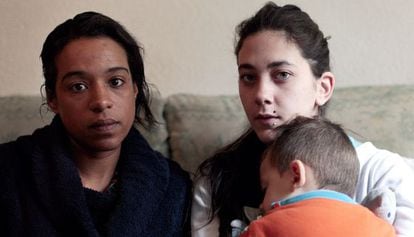Two women fight to avoid jail over seven-year-old credit card crime
Pair get two-year sentences for spending €857 with a stolen Visa, but now lead lawful lives


Madrid, August 13, 2008. Three young women aged 16, 18 and 21 are hanging out in a park. A man walks up to them and asks: “Do you want to buy something for yourselves?” According to their version of events, they didn’t know this man at all, but decided to follow him after a few moments’ hesitation.
The group walked into El Corte Inglés, a department store, and used a stolen credit card to buy items worth €857. As a result, two of the women have been sentenced to two years, four months and 16 days of prison for continued fraud and document forgery.
The worst that could happen, they thought, was that they would return the money and their parents would yell at them
Now, both are hoping for a last-minute pardon to avoid jail, and say that their punishment is too harsh.
The buying spree lasted 30 minutes. They used a Gold Visa whose owner they did not know; the man had not only her credit card but also her ID, which is often needed for purchases using plastic in Spain. At the time, the women say, they thought that the worst that could happen was that they would have to return the money and their parents would yell at them. The possibility of prison was definitely not on their minds.
But Ainhoa Valdés and Irene García have until Wednesday to report to jail, unless they get pardoned first. The regional court of Madrid has confirmed their conviction, and the Justice Ministry has turned down their first request for a pardon.
Nearly seven years have elapsed since they were first arrested. With tears in their eyes, Valdés and García admit that what they did was wrong and say that they deserve punishment – “But not prison.”
Both women note that they are now upstanding citizens. Neither one has relapsed into crime, both have paid fines already, and now hold steady jobs. Valdés, 28, works at a fashion retail chain and says she is about to get promoted. García, 24, is a cook at a restaurant and mother of a two-year-old. Her partner is out of a job.
“We didn’t rob a bank,” says Valdés. “We went out to buy silly things, without thinking it through. I wouldn’t dream of doing something like that today.”
Her father does not understand why his daughter has to be behind bars while “those folks with the black credit cards are still waltzing around,” in reference to the Caja Madrid executive card scandal, which saw bank chiefs rack up millions of euros in undeclared personal expenses.
I made a mistake that lasted 30 minutes. I had never done something like that and I have never done like it since”
Valdés briefly saw the inside of a penitentiary in December 2012, but was released three months later while her first pardon request was being considered. García had just given birth and has never set foot in jail.
“I made a mistake that lasted 30 minutes. I had never done something like that and I have never done like it since,” she says, while her little boy tries to get her to play with him. “Isabel Pantoja made off with half of the city of Marbella and she got the same prison term as me,” she says, in reference to the popular Spanish singer who ended up in jail for her role in political corruption in the southern city. “Can somebody explain that to me?”
Their shopping spree at El Corte Inglés consisted of a bottle of Chanel perfume (€109), MP3 players (€118) and cellphones (€630). But when they attempted to purchase a laptop, the payment was refused. The girls started to get nervous. The man ran off with the goods and was never seen again. The three young women were arrested, but the one who had forged the signature was 16 and could not be tried.
Valdés and García claimed in their defense that they never signed anything, but the judge still considered them “co-authors” of the crime.
Their current lawyer, Juan Miguel López (they initially had a court-appointed counsel), notes that his clients have no previous record and that they are well integrated into society, making a prison sentence senseless.
“In this case, far from seeking to rehabilitate them, the conviction becomes a destructive element, and even a form of retaliation,” he says.
The ball is now back in the Madrid regional tribunal’s court, where Valdés and García have filed an appeal to get their Wednesday deadline suspended while the ministry considers their second request for a pardon.










































